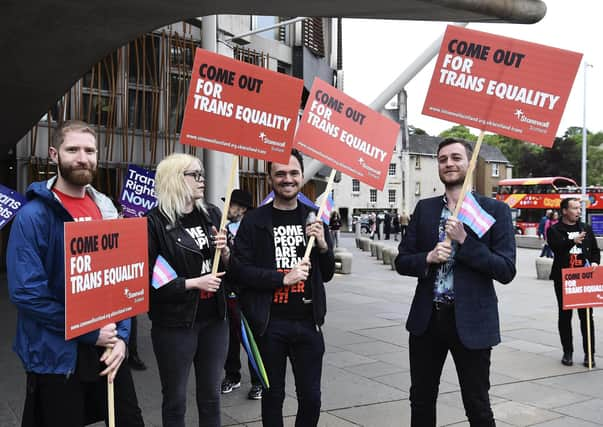Transgender debate in Scotland: As Section 28-style moral panic grows over trans rights, people need to stop demonising this tiny minority – Laura Waddell


You might have seen these Handmaid’s Tale cosplayers dancing around or fighting online. It’s difficult not to engage those hellbent on demonising a minority group, because it is so unjust.
Transphobia reframed as feminist crusade is stomach-churning. But taking bait from bigots can be as futile as appeasing dedicated misogynists – often the abusive message is the point, and they relish the conflict.
Advertisement
Hide AdAdvertisement
Hide AdNot only have contemporary transphobes driven hatred towards trans people, they have reheated moral panic used to attack gays during Section 28, sapped the strength of feminist networks, and encouraged attacks on inclusive charities and women’s shelters already under extreme budgetary pressure.
They ally themselves with anti-choice conservatives and let the patriarchy completely off the hook by scapegoating a tiny minority. Judging by the behaviour of obsessives on this issue who have gone fully down the conspiracy theory rabbit hole and come to view digressive colleagues, friends and even family as the enemy, they are even driving themselves to distraction.
My book of the week is the excellently argued, thoroughly researched The Transgender Issue by Shon Faye.
As she puts it, “the simple moral case for resisting transphobia as a form of cruelty should be enough for anyone who has been similarly victimised by society (as cisgender lesbians, gay men and bisexual people have all been in one way or another), to stand with us in solidarity. Yet it should also be a matter of self-interest. The world in which trans peoples’ rights are restricted relies on narratives of dehumanisation and myths of sexual predation. Restricting trans people’s rights relies on policing other people’s gendered appearance in toilets and changing rooms by arbitrating on who looks male or female enough, and by punishing deviation from rigid norms with intimidation and violence.”
Faye pushes aside prejudicial myths, documenting what life is truly like for trans people in Britain today: how the ‘regret rate’ for gender reassignment surgery is lower than the percentage of women who experience any degree of regret for abortions, or that, contrary to scaremongering about kids transitioning at the drop of a hat, accessing healthcare can be a long, laborious process.
A message from the Editor:
Thank you for reading this article. We're more reliant on your support than ever as the shift in consumer habits brought about by coronavirus impacts our advertisers.
If you haven't already, please consider supporting our trusted, fact-checked journalism by taking out a digital subscription.
Comments
Want to join the conversation? Please or to comment on this article.
